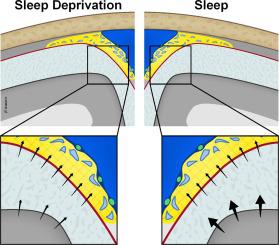Brain Research ( IF 2.9 ) Pub Date : 2021-09-26 , DOI: 10.1016/j.brainres.2021.147669 Per Kristian Eide 1 , Geir Ringstad 2

|
Emerging evidence suggests that the glymphatic system and meningeal lymphatic vessels are instrumental for clearance of toxic metabolites from the brain. Animal and human studies suggest that glymphatic circulation is up-regulated during sleep. Meningeal lymphatic clearance may be more efficient in the wake state, as shown in rodents. We have previously shown clearance of cerebrospinal fluid directly from the subarachnoid space to the parasagittal dura, which harbors meningeal lymphatic vessels. Hence, assessing molecular clearance from parasagittal dura provides an opportunity to decipher the role of sleep/sleep deprivation in human lymphatic clearance function. In this study, we applied magnetic resonance imaging to explore whether sleep deprivation modifies molecular clearance from human parasagittal dura, utilizing an intrathecal magnetic resonance imaging contrast agent as tracer. We hypothesized that tracer enhancement in parasagittal dura would differ after sleep deprivation. One group of individuals (n = 7) underwent one night’s total sleep deprivation while a control group (n = 9) was allowed unrestricted sleep. There were no sleep restrictions after the 24-hour time point. After one night of sleep deprivation (at 24 h), we found neither evidence for altered tracer enrichment in the parasagittal dura, nor after a day of unrestricted sleep (at 48 h). The hypothesis of altered molecular egress to parasagittal dura after sleep deprivation was not supported by our data. Further studies are required to determine the role of sleep for molecular clearance from cerebrospinal fluid to meningeal lymphatic vessels in humans.
中文翻译:

脑脊液流出到人的矢状旁硬膜和睡眠剥夺的影响
新出现的证据表明,glymphatic 系统和脑膜淋巴管有助于清除大脑中的有毒代谢物。动物和人类研究表明,glymphatic 循环在睡眠期间被上调。如啮齿动物所示,脑膜淋巴清除在清醒状态下可能更有效。我们之前已经显示脑脊液从蛛网膜下腔直接清除到矢状旁硬脑膜,其中有脑膜淋巴管。因此,评估矢状旁硬脑膜的分子清除率为破译睡眠/睡眠剥夺在人类淋巴清除功能中的作用提供了机会。在这项研究中,我们应用磁共振成像来探索睡眠剥夺是否会改变人类矢状旁硬脑膜的分子清除率,利用鞘内磁共振成像造影剂作为示踪剂。我们假设睡眠剥夺后矢状面硬脑膜的示踪剂增强会有所不同。一组人(n = 7)经历了一晚的总睡眠剥夺,而对照组(n = 9)被允许不受限制的睡眠。在 24 小时时间点之后没有睡眠限制。经过一晚的睡眠剥夺(24 小时),我们既没有发现矢状面硬脑膜示踪剂富集改变的证据,也没有发现一天不受限制的睡眠(48 小时)。我们的数据不支持在睡眠剥夺后改变分子出口到旁矢状面硬脑膜的假设。需要进一步的研究来确定睡眠对人类从脑脊液到脑膜淋巴管的分子清除的作用。



























 京公网安备 11010802027423号
京公网安备 11010802027423号